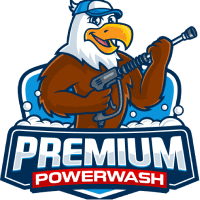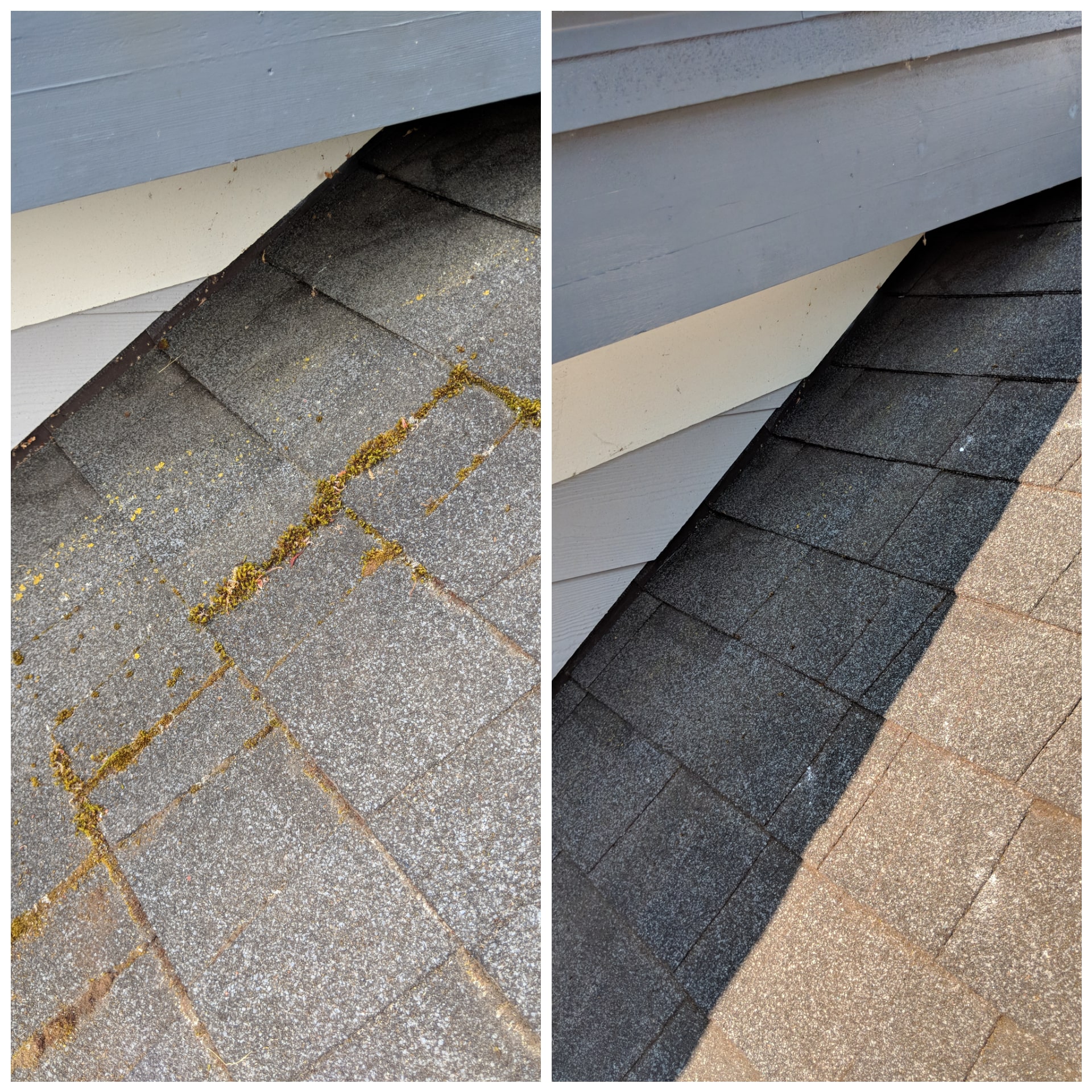The verdant landscapes and moist environments of charming Portland, Oregon, come with a side of picturesque greenery that often ends up on your roof. As picturesque as velvety moss may seem when it carpets the forest floor, if it’s taking root on your shingles, it’s more than a mere eyeful. It’s a potential headache – one that requires a keen eye and a suitable course of action.
Enter ‘softwash’ – a term often whispered among the ranks of tidy roof guardians. Yet, like any cleaning methodology, it comes with a list of benefits as well as its own set of caveats. For homeowners in the Portland area, considering a softwash service for their roof is a pivotal choice. In this comprehensive guide, we’ll untangle the web of pros and cons, empowering you to make the smartest decision for your humble abode.
The Softwash Technique Demystified
Before jumping into the depths of this discussion, it’s crucial to understand what exactly softwash entails. Unlike pressure washing, softwash is a gentler approach to cleaning exterior surfaces, especially roofs. This sophisticated method harnesses the superb power of cleaning solutions combined with minimal pressure water application, ensuring a thorough cleanse without the risks associated with high-pressure treatments.
The Lowdown on the Cleaning Solution
Softwash cleaning solutions often contain surfactants (detergents), algaecides, and sometimes a touch of bleach (sodium hypochlorite). These potent concoctions are customized to handle specific cleaning needs, be it algae removal, mold mitigation, or, in the case of Portland residents, the often relentless moss. Such solutions pledge a deep cleanse while preserving the integrity of your roofing materials – or so the proponents claim.
The Pressurized Water Revelation
But what about water pressure? Traditional pressure washing can reach upwards of 2,000 pounds per square inch (psi), while softwashing hovers at a much more manageable 100 psi. What softwash sacrifices in speed and power, it more than makes up for in careful, nuanced attention to detail. This controlled application prevents damage to delicate roofing surfaces, which is crucial for historically weather-resistant but now more vulnerable terrains under Portland’s intermittent skies.
The Sunshine State Argument: Moss and Its Mitigation
Portland’s well-documented precipitation levels play a key role in the moss’s proliferation. Mosses are ambitious organisms that thrive in environments that are both wet and shaded, conditions commonly found on roofs in damp areas such as Portland. Moss’s potential for causing harm to your roof is not just aesthetic; its presence can accelerate the erosion of roofing materials.
The Moss-Eradication Softwash Solution
Softwash is heralded as a thorough moss elimination process that goes beyond the cosmetic. By leveraging the power of gentle water and carefully concocted detergents, it not only removes the visible moss but also extracts the underlying spores, minimizing the chances of regrowth.
The Bleach Factor and Environmental Considerations
Now, this is where the discussion gets a bit bleacher – pardon the pun. Softwashing roofs with a bit of bleach is effective, yet it raises two significant concerns: potential damage to terrestrial life surrounding the home and long-term impact on the environment. The debate around the environmental friendliness of softwash solutions – particularly the ones that contain bleach – is a topic that’s getting brighter as the industry innovates with more sustainable ingredients.
Myth Busting on ‘No-Rinsing’
A particular claim from some softwash services – like the ‘no-rinse’ approach – might at first sound like a saving grace for Portland’s water supply. Certainly, water conservation is a noble pursuit, but when it comes to cleaning solutions, residual chemical presence can be a double-edged sword. The industry is slowly shifting toward rinsing solutions that are in harmony with sustainable practices, but for now, the ‘no-rinse’ assertion should raise some water-conscious eyebrows.
The Growth and Aesthetics Narratives
Beyond protective considerations, there’s a compelling aesthetic argument for softwash. The removal of moss, algae, and other organic growth from your roof can transform its appearance from unkempt to standout. A clean roof not only looks better but can increase your home’s curb appeal and even its value.
The Hidden Battle: Lichen and Mold
Moss, though notorious, isn’t the only unwanted tenant on your roof – lichen and mold also stake their claim. The cleaning solutions used in softwash treatments target these organisms as well, promising a comprehensive cleanse that leaves your roof free from any growth that doesn’t belong.
Retaining the ‘Look’ with Cautionary Comfort
But what if your roof isn’t particularly dirty? In the case of a moss-emblazoned roof, the transition can be dramatic. However, caution should be exercised to ensure that the cleaning process itself doesn’t become overzealous, which can strip the granular surface and leave shingles looking prematurely aged.
The Durability and Longevity Assertions
The promise of extending the life of your roof and saving money sounds alluring, and rightly so. Softwash adherents claim that by preventing continued moss growth and the damage that comes with it, your roof’s durability is enhanced.
The Structural Integrity Case
Algae and moss might seem like minor nuisances, but their continued presence and the erosion they can cause to roofing materials are anything but minor. By committing to a softwash routine, you’re making an investment in the longevity of your roof, or so the narrative goes.
Weighing the Wear and Tear of Washing
However, it’s important to remember that too much of a good thing can be damaging. Over-frequent washes, or harsh cleaning processes, can accelerate the aging of your roof by stripping away its protective layers, leading to potentially costly early replacements. The delicate balance between preserving and damaging is where the true value of softwash lies.
The Health and Air Quality Considerations
Aesthetics and durability are top of mind, but what about the air you breathe? There’s an indirect impact on air quality – as softwash helps maintain a clean roof, it mitigates the probability of spores that can affect indoor air quality.
The Allergen Abatement Effect
Allergens like moss spores can travel from your roof to the air you breathe, posing an unseen health hazard. Regular softwashing can curtail these potential airborne nasties, contributing to a healthier home environment.
The Health Paradox of Cleaning Solutions
On the other hand, the chemicals used in softwash solutions, compounded by their airborne spread during the cleaning process, pose an immediate health concern for those in the vicinity, be it residents or cleaning personnel. Ventilation and proper drying time are crucial steps to ensure residual chemicals aren’t a constant companion post-cleaning.
The Cost-Benefit Analysis
Is softwash a sound financial decision for homeowners in Portland? The cost aspect can often be the deciding factor. Softwash isn’t the cheapest cleaning solution on the market, but the prevailing argument is that it’s a worthwhile investment in the health and look of your roof.
Investment or Expense?
The cost of softwash can vary based on your location in Portland, the size and complexity of your roof, and the chosen service provider. Balancing the upfront cost with the potential savings of a prolonged roof life, reduced need for follow-up treatments, and increased home value is a rigorous but necessary evaluation process.
DIY vs. Professional: Financial Debates
The DIY route with softwash might seem cost-effective, but it’s a high stakes game. The wrong solution or application at the wrong pressure can lead to damage that trumps any potential savings. This is one scenario where professional expertise can turn a potential gambit into a financially sound decision.
Choosing the Right Softwash Service
If you’re sold on the softwash concept, the next hurdle is finding the right service provider. Not all companies are created equal, and a less-than-stellar softwash can result in wasted money or, worse, an irrevocably damaged roof.
Certification and Professionalism Counts
Look for a softwash service that’s certified and vetted by industry standards. Professionalism in the assessment, quoting, and execution phase is also a mark of a service worth its salt – or rather, its sodium hypochlorite.
Portfolio and References Tell A Tale
Anecdotes can be powerful motivators or deterrents. A service’s portfolio and references can provide a preview of what you can expect. Don’t shy away from asking for specific case studies or talking to past customers about their softwash experiences.
The Verdict on Softwash for Portland Residents
The choice of a softwash service for your roof amid the lush backdrop of Portland’s green canopies isn’t one to be taken lightly. It’s rife with benefits and booby traps that require scrutiny and informed decisions. The softwash industry is evolving, and with it, so too are the claims, concerns, and standards.
In the end, softwash is a tool in the homeowner’s arsenal, one that should be wielded wisely. Whether you’re spurred by the desire to enhance your home’s aesthetic or to bolster its resilience in the face of moss’s encroachment, softwash is a cleaning methodology that commands both caution and consideration.
For those engulfed in the fertile lands of Portland, the decision to softwash or not is a personal one. It hinges on a combination of environmental awareness, financial prudence, health considerations, and the preservation of your home’s sanctity. Is softwash the silver bullet you’ve been looking for in your roof-cleaning endeavors? That question is now in your hands, lying in the same balance softwash promises to keep for your beloved rooftop.

